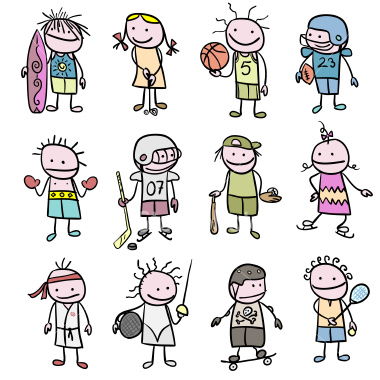Children and Sports
Sports help children develop physical skills, get exercise, make friends, have fun, learn to play as a member of a team, learn to play fair, and improve self-esteem. American sports culture has increasingly become a money making business. The highly stressful, competitive, "win at all costs" attitude prevalent at colleges and with professional athletes affects the world of children's sports and athletics; creating an unhealthy environment. It is important to remember that the attitudes and behavior taught to children in sports carry over to adult life. Parents should take an active role in helping their child develop good sportsmanship. To help your child get the most out of sports, you need to be actively involved. This includes:
- Providing emotional support and positive feedback,
- Attending some games and talking about them afterward,
- Having realistic expectations for your child,
- Learning about the sport and supporting your child's involvement,
- Helping your child talk with you about their experiences with the coach and other team members,
- Helping your child handle disappointments and losing, and
- Modeling respectful spectator behavior.
Although this involvement takes time and creates challenges for work schedules, it allows you to become more knowledgeable about the coaching, team values, behaviors, and attitudes. Your child's behavior and attitude reflects a combination of the coaching and your discussions about good sportsmanship and fair play.
It is also important to talk about what your child observes in sports events. When bad sportsmanship occurs, discuss other ways the situation could be handled. While you might acknowledge that in the heat of competition it may be difficult to maintain control and respect for others, it is important to stress that disrespectful behavior is not acceptable. Remember, success is not the same thing as winning and failure is not the same thing as losing.
It is also important to talk about what your child observes in sports events. When bad sportsmanship occurs, discuss other ways the situation could be handled. While you might acknowledge that in the heat of competition it may be difficult to maintain control and respect for others, it is important to stress that disrespectful behavior is not acceptable. Remember, success is not the same thing as winning and failure is not the same thing as losing.
If you are concerned about the behavior or attitude of your child's coach, you may want to talk with the coach privately. As adults, you can talk together about what is most important for the child to learn. While you may not change a particular attitude or behavior of a coach, you can make it clear how you would like your child to be approached. If you find that the coach is not responsive, discuss the problem with the parents responsible for the school or league activities. If the problem continues, you may decide to withdraw your child.
As with most aspects of parenting, being actively involved and talking with your children about their life is very important. Being proud of accomplishments, sharing in wins and defeats, and talking to them about what has happened helps them develop skills and capacities for success in life. The lessons learned during children's sports will shape values and behaviors for adult life.
What are age-appropriate activities?
Your child is likely to show natural preferences for certain sports or activities. Start there, being careful to keep your child's maturity and skill level in mind.
Ages 2 to 5
Toddlers and preschoolers are beginning to master many basic movements, but they're too young for most types of organized sports. At this age, unstructured free play is usually best. Try:
- Running
- Climbing
- Kicking
- Tumbling
- Dancing
- Playing catch with a lightweight ball
- Pedaling a tricycle or a bike with training wheels
- Supervised water play
Ages 6 to 7
As children get older, their coordination and attention spans improve. They're also better able to follow directions and understand the concept of teamwork. Consider organized activities such as:
- T-ball, softball or baseball
- Soccer
- Gymnastics
- Swimming
- Tennis
- Golf
- Track and field
- Martial arts
Ages 8 and older
By age 8, nearly any sport — including contact sports — may be acceptable. Carefully supervised strength training is OK at this age, too.
Of course, organized athletics aren't the only option for fitness. If your child doesn't seem interested in sports, find other physical activities. Take family bike rides, check out local hiking trails. Encourage active time with friends, such as jumping rope, shooting baskets or playing tag. You can even encourage fitness through video games that prompt dancing, virtual sports or other types of movement.

Articles
2356
Home Visit Service
Your Baby checkup
Is my child developing normally?
what are the vaccinations that he should have taken until now?
Generate a report for my baby.
what are the vaccinations that he should have taken until now?
Generate a report for my baby.
Birthdate *
Track Your Baby Vaccinations
Receive reminders by email for the Vaccination timing
Find Your Baby name
Visit our Clinics
Mohandessin
Address
View Map
21 Batal Ahmed Abdel Aziz St, 3rd floor
Telephones
01002195777
01000012400
0233048350
Beverly Hills
Address
View Map
Beverly Hills, Building 29 services, behind Super Market Al Mokhtar, floor 1.
Telephones
01000012900
0238576831
El Tagamo3
Address
View Map
Elegantry Mall, Unit 221
Telephones
01000012800
01000884592
Al Sheikh Zayed
Address
View Map
Al Sheikh Zayed - Entrance 2,Downtown Mall - In-front of Spectra ,First Floor - Clinic 113
Telephones
02- 38514031
01000608597
Please enter your e-mail


